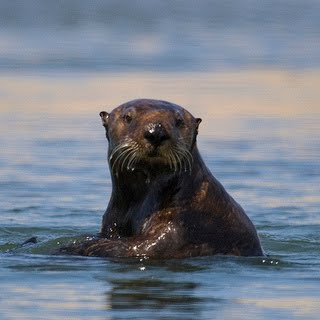The imagination is troubled by thoughts of the thousands of innocent creatures endangered by the BP oil spill off the Gulf Coast: Brown pelicans, sea turtles, migratory birds, songbirds and hummingbirds, otters, and many others, some of them unknowingly stopping on their annual ritual of migration, others simply trying to get through life in their natural habitats. Many of them do not survive; some are permanently damaged. That is the tragic cost of oil.
So many have sacrificed too much to appease the fossil fuel god. Mine workers die; oil rig workers die; animals are hurt and killed; the environment is constantly assaulted. I have read that not until oil prices become inordinately high will alternative forms of sustainable energy become cost-effective. The hidden price is already too high.
Especially troubling are the innocents caught in the crossfire. Whether or not one believes that life has a purpose, and that the arrangerment of the worlds' creatures has meaning, one's spirit is refreshed at the thought that animals may provide us with the answers on how best to live. Instead, we repeatedly ask animals to suffer for our mistakes, or our pleasure.
It's overwhelming to consider the many animals that will be harmed by this latest disaster, as the ink (or oil, as it were) has barely dried on the rescue efforts of the Exxon Valdez, and other blown tankers.
So I think of just one pelican, one sea turtle, and the quiet tragedy they endure in such a disaster, and the unsung heroics of good people who try to help these creatures.
It's not only one oil spill. There have been many others, which often escape media attention. We harm these creatures in countless ways, and they suffer without complaint. By ignoring the wonderful potential inherent in coexisting with these creatures and learning life lessons from them, rather than hurting them, we are missing out on a spiritually human opportunity.
I remain thankful that there are trained animal rescue workers, and scores of volunteers being trained, to do hazardous oiled animal rescue, cleaning and rehabilitation.
Professional workers must be carefully trained not only to pick up and handle affected wildlife, but to take care that they themselves don't suffer serious health consequences from exposure to crude oil.
A rescue process takes about seven steps and can consume weeks or months before an animal is returned to the wild. Often, they die soon after release because of lasting damage caused by ingesting oil. And new migrators are again in danger and the cycle repeats itself.
For those wanting to know more about opportunities to volunteer or donate, check out the Discovery web site HERE.
We have to speak for them.....
The video below was recorded by The Carpenters in 1971. Nominated for an Oscar from a melodramatic yet hearfelt movie of the same title, "Bless The Beasts and Children" was criticized for being cloying, saccharine.....and maybe it is. On the other hand, if an animal were able to write an anthem for its own kind, it might sound exactly like this. I think it's rather beautiful; there's an innocence about it that is endearing. Enjoy the song, and the gentle visuals that accompany it.


Apparently, they're collecting hair to sop up the oil. One of my friends has already donated hers to the cause. I only hope it's a solution that works, and one that enough people take part in to effect it.
ReplyDeleteBeautiful post, Tom, and very moving. So sad when you think about the many species that this oil disaster will decimate and the lasting toll it will take on the ecosystem of the gulf. I saw an article this morning where there were a lot of dead dolphins poisoned by the oil washing up on the beaches of Mississippi. It's absolutely heartbreaking.
ReplyDeleteWalter: I heard about the hair collection as a means to absorb oil. I hope it works...
ReplyDeleteTom: Thank you for the update. This is sobering stuff, and it seems we will not learn. The new "Energy Bill" offered by John Kerry and Joe Lieberman contains a provision for off-shore drilling. Sure, states can pass legislation to prevent drilling off their shores and those of neighboring states....but it begs the question of why it is still an option in light of what's happening.